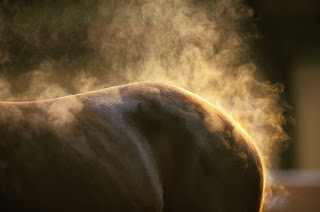Electrolytes are mineral salts which, when dissolved in water, become electrically charged particles called ions. However, whilst scientifically accurate, this explanation offers little help to many horse owners when it comes assessing their horse’s need for electrolytes.
When horses sweat they lose electrolytes, the main ones being sodium, potassium, chloride, calcium and magnesium (although calcium and magnesium are lost in smaller amounts). Sweating rates can be as high as 10-15 litres of sweat per hour, with electrolyte losses of approximately 10g/ litre. Electrolytes are important for many cell functions including muscle contractions and the transmission of nerve impulses. A lack or imbalance of electrolytes can affect almost every physiological system in the horse's body and result in conditions such as heat stress, fatigue, synchronous diaphragmatic flutter (thumps) and tying up. Electrolytes control the direction of water in the body and maintain fluid balance. The body needs electrolytes to retain water which is why you may have read that it is more difficult to rehydrate by drinking water alone.
However, the amount of electrolytes lost is proportionate to the amount the horse sweats and consequently, free access to a salt lick and plenty of forage (hay provides potassium) is more than sufficient for many leisure horses and those in light work. In fact, most losses would gradually be replaced over time, simply by the horse eating and drinking normally. However for horses sweating heavily and on a on a regular basis, a water and electrolyte solution will aid a more rapid and effective recovery. Regardless of this, it is not possible to replace total losses in one feed/ solution. Such supplements aim to support hydration and the replenishment of electrolytes but in fact, it will take several days for levels to be fully restored following heavy and prolonged sweating. Whilst it is not possible to ‘preload’ electrolytes, maintaining hydration and electrolyte balancer prior to exercise/ competition is an important precaution, helping to reduce the risk of conditions such as tying up.
Table salt (sodium chloride) and in heavier work a combination of table salt and Lo Salt (potassium chloride and sodium chloride at a 2:1 ratio), can be a cheap and effective form of electrolyte replacement, either added to horses feed or diluted in water. Water must be available if adding salt directly to the feed and must also be offered as alternative to horses that refuse to drink the salt and water solution (this is also the case if using commercial supplements). Apple juice has been recommended by many as an effective flavouring but horses should be ‘taught’ or accustomed to drink the flavoured water before salts are added.
Although more expensive, commercial electrolyte supplements can be beneficial, despite speculations that some contain little more than sugar. Whilst we now know that horses do not need high levels of sugar in order to absorb electrolytes, ingredients such as dextrose and sucrose are often still included to help make supplements palatable and provided that they also contain appropriate levels of electrolytes, this is not a problem. Look for supplements containing sodium, potassium, chloride and ideally magnesium and calcium too. Sodium and potassium should feature near the top of the list of ingredients, with sodium provided in the largest quantity. For competition horses, also take care to ensure that any supplement used does not contravene FEI rules and is covered under the UFAS BETA NOPS code.
Electrolytes are undoubtedly important, but it is easy for such a scientifically complex subject to cause confusion. If you think your horse may need additional electrolytes, ask a nutritionist for advice on adding salt to his feed, or look for a supplement manufactured by a reputable company. Such companies should have a nutritionist available to clearly explain the benefits of their product, what’s in it and how to use it safely.
